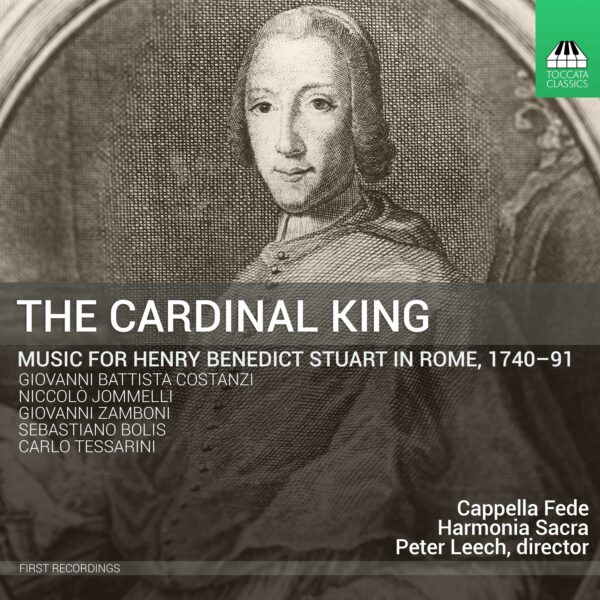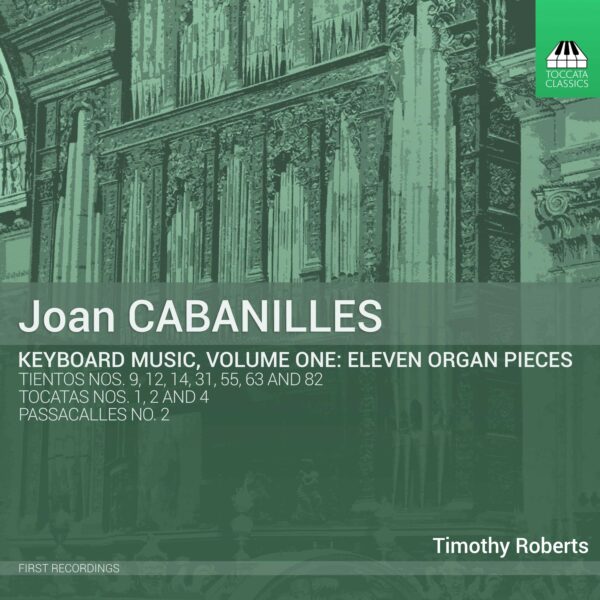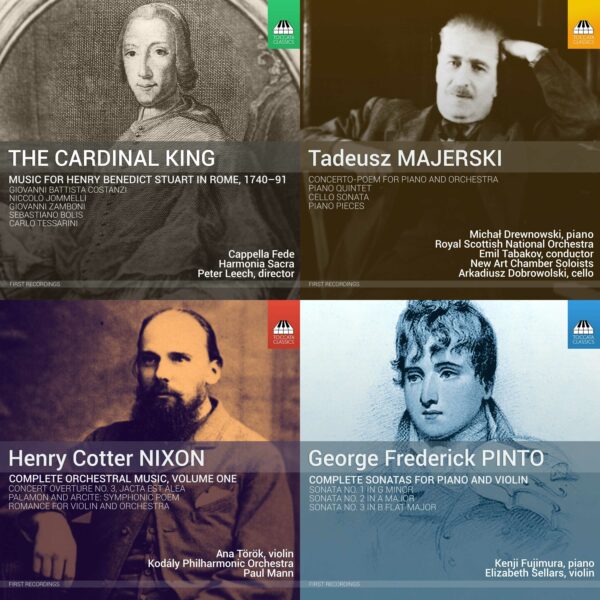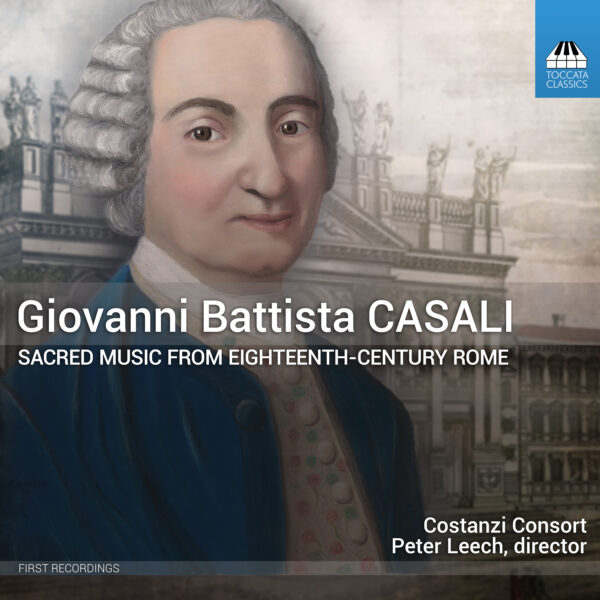The Cardinal King: Music for Henry Benedict Stuart in Rome, 1740-91
£8.00 – £14.00
Catalogue No: TOCC0300
EAN/UPC: 5060113443007
Release Date: 2016-12-01
Composer: Carlo Tessarini,
Giovanni Battista Costanzi,
Giovanni Zamboni,
Niccolò Jommelli,
Sebastiano Bolis
Artists: Cappella Fede,
Harmonia Sacra,
Peter Leech
The music recorded on this album presents for the first time the hitherto forgotten repertoire composed by the many musicians associated with, and employed by, Cardinal Henry Benedict Stuart (1725–1807), a grandson of King James II of England and VII of Scotland, the brother of ‘Bonnie Prince Charlie’, and the last in the direct line of Jacobite succession. Sitting on the cusp of the Baroque and the Classical, these pieces likewise tread a delicate path between innocence and grandeur, between charm and formality, and suggest that the Cardinal, for all his power, may have been a rather gentle man.
Cappella Fede
Harmonia Sacra (Tracks 10, 17)
Peter Leech, director
Listen To This Recording:
-
SEBASTIANO BOLIS (c. 1750–1804)
- Assoluzzione Prima: ‘Subvenite sancti’ (c. 1780)
- Assoluzzione Seconda: ‘Qui Lazzarum resuscitasti’ (c. 1780)
- Assoluzzione Quinta: ‘Libera me Domine’ (c. 1780)
- Jesu quaeritis Nazarenum (1789)
- Splende fredda luna (c. 1755)*
- O memorie funeste (c. 1755)*
- Ave Maria (c. 1750)
- O come se’ gentile (c. 1755)*
- Laudate pueri Dominum (1791)
- Miserere (1790)
- I Adagio
- II Allegro
- III Allegro
- Oculi omnium (c. 1750)
- Allettamento Secondo: II Andante (1740)*
- Feritevi, ferite (c. 1755)*
- Letanie della Madonna Santissima (1785)
Cinque Assoluzzione: Nos. 1, 2 and 5
GIOVANNI ZAMBONI (fl. c. 1740–60)
GIOVANNI BATTISTA COSTANZI (1704–78)
ZAMBONI
BOLIS
CARLO TESSARINI (1690–1766)
Allettamento Terzo (1740)
NICCOLÒ JOMMELLI (1714–74)
TESSARINI
ZAMBONI
BOLIS
All Except * First Recordings




Andrew Benson Wilson Early Music Review :
‘What a great CD, with the bonus of a fascinating back-story! … The CD opens with the mournful music of Sebastiano Bolus’s Subvenite sancti, one of the five Assoluzzione, written for the funeral of Bishops around 1780. Bolus is the main composer featured on this recording. … Two of most substantial works are included: the alternatim setting of the Miserere and the Letanie della Madonna Santissima is the concluding track. … It is a glorious example of the Roman Classical style, with elaborately ornamented sections for a solo soprano (Elizabeth Dobbin) alternating with choral passages, the whole while cleverly incorporating the much repeated refrain of Ora pro nobis into the musical texture. … The four solo singers and four instrumentalists of Cappella Fede produce fine sounds individually and in consort. Violinist Hazel Brooks, features as the impressive soloist in Tessarini’s Allettamento Secondo (Andante) and his three movement Allettamento Terzo, written for violin and cello. In the other works, organist Matin Knizia provides continuo accompaniment, with some solo passage work in the lively Laudate pueri Dominum by Bolis. The 14-strong Harmonia Sacra choir are equally impressive in their contributions. … This is an important contribution to musical research, but also a delightful insight into the attractive music that graced the Roman court of a man who could have been a King, were it not for the complexities of religion.’
—Andrew Benson-Wilson, Andrew Benson Wilson Early Music Review
MusicWeb International :
‘Bolis’ setting of the psalm Miserere (track 10) is the longest work here and for me one of the highlights of the programme. Sung alternatim – alternate verses in Gregorian chant from a soloist and by a choral group – it’s much less elaborate than the ubiquitous Allegri setting of the same text, to which it makes a very fine alternative. … Niccolò Jommelli’s Oculi omnium is another highlight of the recording. The text in itself is not particularly intense but it receives an intense setting from Jommelli and an appropriate performance. … Little-known this music may be but the quality of what is on offer here justifies Toccata’s enterprise in making music which has ‘languished in obscurity’, to quote the booklet, much better known. These well-recorded performances fit the bill superbly and I hope to hear much more from all concerned. As usual with Toccata releases, not the least of the virtues of this recording is Peter Leech’s excellent set of notes: scholarly and informative.’
—Brian Wilson, MusicWeb International
Tiago Manuel da Hora :
‘The Cardinal King, performed by the British ensemble Cappella Fede, joined by Harmonia Sacra choir in two works and directed by Peter Leech, presents a very well chosen program with a great deal of first recordings and, most importantly, one very interesting repertoire from a historical and musical point of view. Alongside the predominant sacred music, we for the first time can hear instrumental music for violin, viola and continuous bass (here with cello and positive organ) by Carlo Tessarini. As it does not always happen in new recordings of the old repertoire, this album presents a musical corpus that truly deserves to be divulged and that fully justifies its phonographic editing. … In short, in my opinion, this is one of the best and most interesting editions that Toccata Classics has published in recent months, among the top 5 of its catalog of 2016.’
—Tiago Manuel da Hora, X Music
Fanfare Magazine :
‘Many of these works appear here for the first time, and the performance by the vocal ensemble Capella Fede (with the appearance of Harmonia Sacra consisting of voices and continuo in two of the numbers) is excellent. While the focus on the music at Henry’s court in Rome may be the reason for the disc, the music of Bolis in particular seems well composed enough for further exploration. The voices are clear and right on pitch, something that is crucial in such an exposed set of works. The tempos are generous but not too lugubrious. All in all, this is one disc that should be checked out, as it contains unusual and lovely music by composers who are all but unknown. Highly recommended.’
—Bertil van Boer, Fanfare Magazine, July/August 2017
chris c. :
Totally stunning.